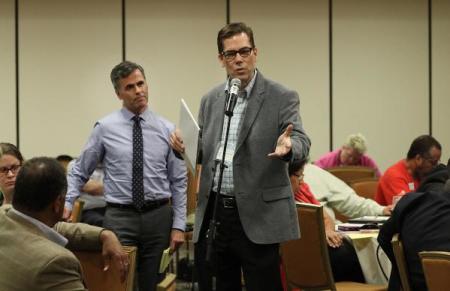United Methodist Body Votes to Change the Church's Position on Homosexuality by Allowing Clergy to Be 'Practicing Homosexuals,' Perform Gay Weddings

A United Methodist body approved proposed legislation that would, among other things, allow clergy to perform gay marriage ceremonies and local conferences to ordain non-celibate homosexuals.
The Connectional Table voted 26 to 10 in favor of proposed legislation that would allow clergy to perform gay weddings without concern of facing church discipline or to be "openly self-avowed practicing homosexuals."
While the proposal was passed by the Connectional Table, the General Conference, the denomination's top lawmaking assembly, will determine if it becomes official policy when it meets next year in Oregon.
"If this legislation passes, clergy would not risk church trials or the loss of their credentials for officiating at same-gender weddings or, in some conferences, coming out as openly gay," reported the United Methodist News.
"At the same time, the proposal notes that the denomination 'historically has not condoned the practice of homosexuality and has considered the practice incompatible with Christian teaching.' It also retains the denomination's ban on using church funds 'to promote the acceptance of homosexuality.'"
The Christian Post reached out to the Connectional Table, but due to scheduled meetings a representative could not return comment by press time.
John Lomperis, director of the United Methodist program at The Institute on Religion and Democracy, told The Christian Post that the Connectional Table proposal was a bad idea.
"This legislation would essentially replace the UMC's current biblical policies on marriage and sexuality with the same sort of liberalized policies of denominations like the Episcopal Church, with similarly disastrous results," said Lomperis.
"Thus, with this move, the Connectional Table has further committed itself to an agenda that would split apart our denominational connectional. But the majority of members have made clear that they simply care about 'winning' at any cost, no matter whose voices they exclude from the table …"
According to the UMC's governing document the Book of Discipline, homosexuality is "incompatible with Christian teaching."
The Discipline also says that clergy can neither bless gay weddings nor can non-celibate homosexuals be ordained.
At the UMC's most recent general conference, held in 2012 in Tampa, Florida, a resolution introduced to change the Discipline's language on these positions was voted down. But the controversy over the Mainline Protestant denomination's position on homosexuality continued.
Last month, the UMC Commission on General Conference, which plans the general conference meetings, proposed a way to specifically handle proposed legislation, like that which was voted on in 2012.
Called a "Group Discernment Process," if approved, the new method will involve sexual ethics petitions going through small group review before entering the usual committees.
Regarding the possible success of the Connectional Table proposal, Lomperis of the IRD told CP that "I do not at all expect this to pass General Conference."
"People who expect General Conference to pass this either don't understand our system well or else simply don't get out much from their left-wing echo chambers," said Lomperis.






















